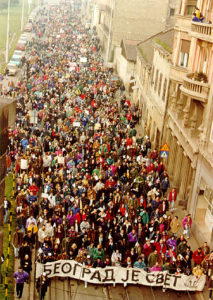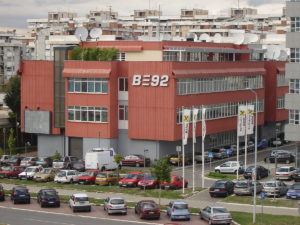Minds of the Movement
An ICNC blog on the people and power of civil resistance
by Ivan MarovicApril 30, 2020
The pandemic came as a shock for many activists and movement organizers. They’ve been questioning their governments for years, mobilizing people to hold traditional powerholders to account. Now it seems the tables have turned. Public mobilization and gatherings are seen as irresponsible by a majority of people and measures adopted to slow the spread of the virus are being used by governments to clamp down on dissent. Is this virus going to strengthen the autocrats’ grip on power? And what can we do now and in the future?

Students protesting Milošević's controversial policies, 1996-1997, years prior to the NATO bombing. Source: Enacademic/Wikipedia.
Although I don’t have experience with epidemics (the smallpox outbreak, the last epidemic in Yugoslavia, happened a year before I was born), I do see some similarities between the current moment and the NATO bombing of Serbia in 1999, which came when our movement Otpor was just a few months old. The bombing—which was prompted by Slobodan Milošević's operation of ethnic cleansing of Albanians in Kosovo—was a major setback for the movement and greatly impacted the direction we took.
When a country is under attack, any dissent is viewed as unpatriotic—not just by the population at large, but often by movement activists themselves. As soon as the fighter jets took off, we knew that we couldn’t continue our open dissent. Before the first bomb fell, the whole country was united behind Milošević, not because people liked him or trusted him, but because they needed to get united behind someone at that time of existential crisis. As a movement we felt our momentum had stopped and, stuck between the outside threat and the regime, we could not do anything.
Similarly, today some nations are uniting behind their leaders, not because of these leaders’ qualities but because of the nature of the threat they’re facing. People need leadership at this grave moment—many feel it’s not the time to dissent but rather to fall in line. And the autocrats feel this and hurry to assert themselves, grabbing power under the guise of fighting the virus.
Milošević did the same back in 1999. As soon as the NATO bombing started, his government shut down the independent radio station B92, which was one of the few uncensored sources of news in the country. And while people were looking up fearing death from the skies, Milošević’s death squad assassinated Slavko Ćuruvija, regime critic and editor of an independent newspaper. And there was hardly any reaction at all. Milošević got away with it—at least it seemed at the time.
This assassination came as a devastating blow to many dissidents, including Otpor activists, but there was nothing we could do about it except be extremely careful and lie low. But while we were dormant as a movement, we at least had time to strategize. It was clear that the plans we were organizing were not going to be implemented in the near future, so we had the chance to think big. So we did, and we had several weeks to do so.
We first went through a process of introspection to understand ourselves, our motivations, our values, our inner strengths, and activities we would need to keep going. Then we did a careful analysis of the social and political environment, the nature of the regime, and most importantly, the basis of support it had among certain groups. This helped us devise the strategy we would roll out soon after the bombing ended and which helped us emerge from the struggle victorious a year later.

Serbia's B92 radio station was a force behind many demonstrations that took place in Belgrade against Milošević's policies. Source: Дарко Максимовић/Wikipedia (CC BY-SA 3.0, unedited).
The bombing indeed ended after three months, and the support Milošević had enjoyed started to disintegrate rather quickly. Spontaneous protests popped up across the country, army veterans went on strike, and dissidents came out of hiding. Without the external threat to unite the people, the regime began to falter. Yes, diehard supporters still hailed Milošević, but the majority of the population was ready to move on. At the same time, we were putting the finishing touches on our strategy, which we published shortly thereafter as the Declaration on the Future of Serbia. We resumed mobilization following the publication of the Declaration, and our momentum, which seemed lost, came back stronger than ever before.
Here’s the lesson for today’s moment: stay safe and use the opportunity to strategize. Once the worst is over, people will need a clear way forward. This pandemic is closely connected to authoritarianism. It originated in a country where people are not free to speak. Doctors who blew a whistle about the novel coronavirus were silenced. As it is spreading across the world, it is wreaking havoc in countries where regimes are more interested in their self-preservation than in their population’s health.
But their people will not forget so easily. All the lies, coverups, blame games, profiteering, incompetence, and scapegoating will come back to bite those leaders. Once the threat from the virus is reduced, more and more people will start questioning the system under which they live. Is it making them vulnerable? They will start looking for answers and for a way forward.
And you’ll be there with a plan.

Ivan Marovic
Ivan Marovic is Executive Director of ICNC. He was one of the leaders of Otpor, the student resistance movement that played an important role in the downfall of Slobodan Milosevic in Serbia. After the successful democratic transition in Serbia, Marovic began consulting with various prodemocracy groups worldwide and became one of the leading practitioners in the field of strategic nonviolent conflict.
Read More